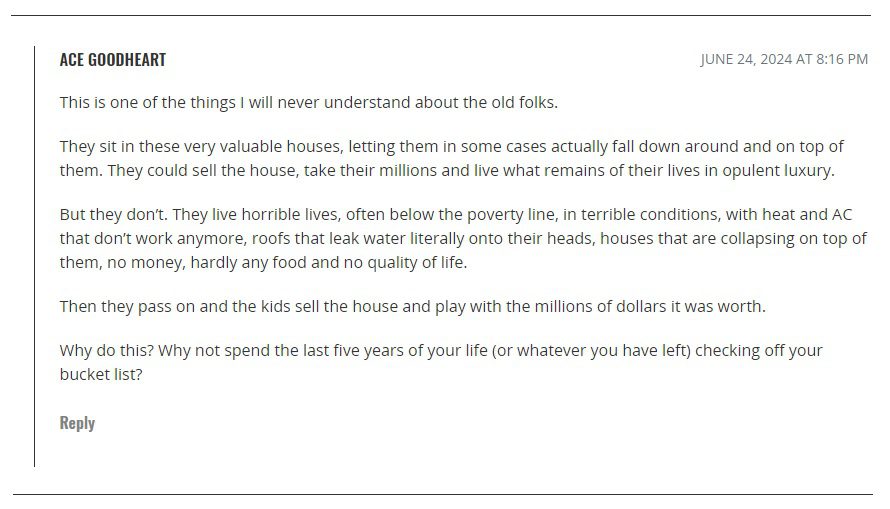First and foremost, thank you to the readers who commented on Monday’s blog! I enjoyed the stories about your friends, family, and neighbours and their experiences with downsizing – or not.
The comments were on point. The stories were enlightening.
And Ace Goodheart provided a comment that really got me thinking:

I don’t want to say, “I had never thought of that before,” but to some extent, I hadn’t.
I mean I’d thought of it, but not like that.
Why do some seniors remain in their homes until the end of their lives?
I would think for most of them it’s because of the emotional connection they have to the house, or an extreme aversion to change. I can’t imagine living in a home for fifty years and then pulling the trigger on a move.
Perhaps it’s not so much an aversion to change as it is a lack of understanding of other options, or what other people their age do, or how to get from A-to-B.
Not everybody wants to sell their family home and move to a condo in Florida. Not everybody wants to downsize from their long-time family home to a smaller house or condo, and then use the remaining sale proceeds to “enjoy life.” But I’m willing to bet that there are a lot of folks who have just never sat down and given it a long, hard thought.
In any event, on Monday, I offered what the children of elderly sellers or an estate will “need” to do in the process.
You need to decide if your parents are signing legal documents or if you’re going to be a Power of Attorney.
You need to decide what to do with all the “stuff.”
You need to decide if the home is being sold in “as is condition” or not.
That’s merely to get us started.
Today, let me follow up on those “needs” and offer some “mights,” as in you might encounter these situations.
Or not.
But damn, are they ever common. Please don’t say I didn’t warn you…
You might disagree with your siblings, or worse.
Sometimes, we know when this is coming. Other times, we don’t.
The most difficult familial situation I ever dealt with was for the sale of an estate about ten years ago where there were four children and none of them spoke to each other.
To complicate matters, the deceased left the home to one of the four children, for reasons that were completely fair and made perfect sense, but that I won’t get into today.
The other three children were suing the rightful heir of the home (ie. the daughter who was left the house in the will), but she was one of those salt-of-the-earth people who simply said, “It’s fine, they can each have their share,” even though the deceased specifically left the home to the one child.
When it came time to review offers, all four children came to our old office on Merton Street, but each of them sat in a different room. In fact, we used to have two buildings next-door to each other, one at 276 Merton Street and one at 290 Merton Street, and to ensure the four siblings didn’t see one another, let alone interact, we put two of them in two different offices, on two different floors in 276 Merton Street, and the other two were situated in two offices, in two different floors, at 290 Merton Street.
This is an extreme case but, unfortunately, it’s not uncommon.
As I said, sometimes we know this is the case in advance, and sometimes the siblings start to disagree (or worse) as the sale process goes on.
Even though I’m often dealing with clients who are twenty or thirty years my senior, I tell them in advance that the sale process might cause some friction with their siblings.
It’s just like the advice I give people when they’re planning a wedding:
Weddings are beautiful. Weddings are a once-in-a-lifetime event that you will cherish forever. But there is going to be one person who gets on your nerves, undermines you, challenges you, bothers you, and/or doesn’t support you throughout the process of planning and executing the wedding, and you don’t know who that’s going to be.
Am I wrong?
Most of you are married, so tell me there’s not always that one person.
It could be the bride’s mother. Then again, it could be the groom’s too. Maybe it’s a bridesmaid? Yes, I could definitely see that. How about an absentee father? Or a nosey aunt?
There’s always that one person and you don’t know until the friction is already underway.
The same is often true of selling an estate or your parents’ home when there are multiple siblings.
Imagine a family of five being able to sell their parents’ house without a single issue. Because I can’t.
My cup isn’t half-empty here, folks. I’m just being realistic, and this is coming from my experience.
I’ve seen all kinds of reasons for disagreement, and the tough part is, it’s usually the sibling doing the best job and the most work that gets dumped on. Picture the sibling who isn’t involved, or isn’t present, but who wants to suddenly take charge at the 11th hour, or who attempts to change course after plans are already underway. So many times, I find myself telling that lead sibling, “Don’t expect a ‘thank you’ when this is done.”
Siblings can disagree or fight for a multitude of reasons and, sadly, every estate sale or relocation of elderly parents provides new things for siblings to quarrel over.
I worked with an elderly couple once who were looking to downsize to a condo and I worked closely with one of the two adult children during the process. But the other adult child would routinely email me, privately, and tell me where he wanted the parents to relocate to and how he wanted this process to work.
It put me in a rather difficult spot. I didn’t want to tell his sister, who was leading the charge and doing all the legwork, or the parents, who were likely too old to understand, or worse, would defend him. That’s very common, right? We all know a family with three children where the parents dote on the least accomplished, most problematic, and most dramatic of the three?
Sure we do.
So think about how that works when the runt of the litter decides he or she has a hare-brained scheme. “Let’s not sell the house; let’s put an addition on to it, and maximize the value!”
Except, he’s not a builder, right? He’s “retired.”
I’ve had that exact situation before and I’ve had many like it.
And when there’s money involved, you can see siblings who are on the absolute best of terms end up arguing or even coming out of the sale process not speaking to each other.
You might have a different plan than one of the other children, heirs, or executors.
Picking up on the theme above, this is often where much of the friction comes from.
There are many ways to sell home in Toronto, and when it comes to an estate sale or selling your own parents’ home, there are all kinds of different variables, obstacles, and paths that you could take.
Like I said above: we all know the family that has the “crazy little brother with all his bright ideas,” and that little brother could believe that it would be wise not to sell the house, but rather to keep it and build a roller-coaster on the property.
But beyond the big-ticket items, often we see disagreements on smaller parts of the process.
Should we empty the entire house before listing for sale? Of course. But one sibling might think “It doesn’t matter, it’s the same damn house,” and refuse to split the associated cost.
How do you price the property? When do you list for sale? Typically, these decisions are passed on to me, but often we have disagreements between the siblings and one or two decide that they have a better listing and/or pricing strategy.
When it comes to downsizing the parents, siblings often disagree on where and in what type of property the parents should live.
And when some siblings stand to benefit financially, I’ve often seen a push to move mom and dad to a smaller, tighter, but cheaper condo than the one they really want.
I know this sounds depressing, but I’ve seen it all…
You might feel nostalgic going through old things.
Raise your hand if you’re an unemotional robot?
They exist, and I suppose there are pros and cons to that. Haven’t we all said at one time or another, “I wish this didn’t bother me, but it does!” If you were devoid of emotions, then you could eat popcorn while the wrecking ball slams into the red-brick of your childhood home and exposes what used to be your bedroom…
I had a listing earlier this year that was delayed by two full months.
The problem wasn’t the probate, or the lawyers, or the real estate market conditions.
The problem was that the two siblings, a brother and sister, wanted to go through everything in the house.
Of course, they didn’t know this at first! They thought they would simply walk through, keep a few moments, give a few items away, and junk the rest.
But I’d say it was sometime around the email that said, “David, we’re sitting on the concrete floor in the basement reading through our grade school report cards that mom and dad kept,” that I knew the process of cleaning out the house was going to take longer than expected.
My mother, God love her, kept everything of ours from childhood.
Remember when you signed up for house league soccer as a child and they provided a jersey, socks, and a pair of standard black shorts? I played soccer from grade-one right through grade-twelve, and when we cleaned out the family house in 2007, didn’t I find twelve pairs of black soccer shorts in a bin?
Yessir.
My mom kept everything.
But the thing she kept that I’m so glad she did, and I actually regret not spending more time sorting through was ALL of my schoolwork from Junior Kindergarten through O.A.C. And yes, I was a product of the “Grade 13” system. I mean all of it. Every single drawing or piece of art that I produced in 1984 was in a file box labelled “J.K.” When it came time to clean out the house in 2007, I kept a handful of items, but threw out 99% of it. I realize that I don’t need eight-five pieces of my art from when I was four-years-old, but I also wish I had kept more than I did.
Oh, and by the way – my mother kept all of my report cards separately in her house, so those weren’t thrown out with my school work in 2007.
So I can relate to my clients who spent weeks sitting on the floor in their parents’ basement as they sorted through box after box of childhood moments. What started with their report cards led to their sports team photos, then to their craft books, then to some of their baby clothes, which really got them emotional.
They kept apologizing. “David, we’re so sorry this is taking so long. We know you want to get this to market, but we’re just paralyzed. We need to go through all this stuff. For our own good. For our sanity. Just to know that we did.”
Geez, I certainly wasn’t going to rush them! I’m one of the most nostalgic people you’ll ever meet, trust me on that. So I knew what they were going through.
But it’s not just your things that you might get nostalgic and emotional about; it’s also your parents‘ things as well.
Do you take framed family photos off the wall and throw them in a dumpster?
What do you do with Dad’s military uniform? He served with honour. Are you going to throw that away?
You know that you can’t take everything with you and that there are some things of mom and dad’s that nobody wants. But when you throw “dad’s chair,” the one that he sat in every single night at 8:00pm like clockwork, for thirty years, into the dumpster, it’s impossible not to feel pain. Even for robots.
You might encounter a “neighbourhood genius” or two.
We just listed a property for sale for $2,995,000.
Two weeks ago, the seller told me, “Hey, there’s this guy on my street that really wants to get inside. He wants to see it before we get to market and he seems super keen. Can you show it to him?”
I told my client that every neighbourhood as a “genius” or two and that this guy wasn’t going to be real buyer. He had to trust me on that.
Two days after we listed, my client told me, “Hey, you were right about that guy on my street. He told me he would be ‘happy to take it off my hands for $2.6 Million’ because the market is shit, and all.”
Now, imagine how many neighbourhood geniuses come out of the woodwork when they know that mom and dad have moved into a retirement residence or passed away? Imagine how many people will come knocking with their “spectacular offers” once you get that dumpster in the driveway?
I’m not trying to turn this into an advertisement for hiring your local Re-la-tor, but I am suggesting that you need to be very weary and very suspicious of anybody trying to “help” you with any and all aspects of the house. I see this all too often, and while I’m not saying “there’s no good left in society,” trust me when I say that the buzzards start circling the property as soon as mom and dad move out.
You might not understand the current market conditions.
I represented an estate sale two years ago where our target price was about $1,200,000 and I wanted to list the property for $899,900.
I explained the process to the three siblings over a Zoom call and two of them were on board.
The third told me, “We are not selling this house for $899,900.”
I explained the process again, describing an under-listing strategy and how “offer nights” work, but again, he told me, “I hear you, and I understand, but I am NOT selling this house for nine-hundred grand!”
I’ve dealt with children of the parents who are absentees, or living abroad, or even living in a small town on Ontario but who have no concept of the Toronto market.
The Toronto market is extremely chaotic, and that’s true of red-hot markets and ice-cold markets alike. The market can change direction on a dime and this means that listing and pricing strategies do as well.
Then there’s home inspections, surveys, rental items, warranties and representations, photos/video, and everything from open houses to lawn signs that will seem very different to somebody who isn’t living and breathing the Toronto market.
Of course, I’m only talking about Toronto sales. On the flip side, if you’re living in Toronto, your sister is in Montreal, and your brother is in New York City, but your parents’ home is located in Saskatoon, then you’re going to have absolutely no idea how things work out there either.
You might need help with the tax implications.
There are two kinds of people in this country:
- Those who want to tell the government what is owed, pay it, and then fight like hell to never pay another penny.
- Those who want the government to tell them what is owed, pay in full, and hope that they don’t have to pay more.
Taxation is like the law: there’s a lot of room for interpretation.
I’m not an accountant, or a tax lawyer, or an estate lawyer, but I can tell you that a good lawyer and/or accountant is worth their weight in gold when you’re selling mom and dad’s estate.
Dying is expensive, especially in Canada.
The time to start dealing with tax implications is not after a sale. It’s as soon as reasonably possible.
You might encounter issues with vacancy tax or increased insurance premiums.
Didn’t think of this one, did you?
Imagine the City of Toronto coming after you for a “vacant home tax” because your mom died and the house sat empty as you dealt with probate, wound down the estate, and emptied the house?
No way they would do that…………right?
A vacant home is a vacant home.
And on a long enough time horizon, the vacant home tax will apply.
Not only that, if an insurance company knew that the house was empty, and nobody was living there, ready to deal with a leaky pipe or godbid an electrical fire, then the premiums would increase massively.
Raise your hand if you’re reading this on Friday afternoon while sitting on the dock at your cottage?
Don’t raise your hand if you’re reading this on Thursday morning while sitting on the King streetcar, creeping along…
Once again, I would encourage anybody to share their experiences with moving mom and dad, or selling the family home. Pros and cons, the good, bad, and ugly, and the trials and tribulations.
Happy Canada Day, everybody! I’ll be back on Tuesday of next week.
































Frances
at 8:14 am
I’d be more worried about a home insurer taking an off-coverage position than I would be about any increase in the premium. Most policies have an exclusion whereby if a property is unoccupied for over 30 days your insurer can deny your claim.
Marina
at 12:31 pm
Sometimes I’m really glad I’m an only child.
A friend worked as an executor in a trust company for awhile, and she had the same stories. Some people would email from out of province and just say “sell everything and mail me a cheque. Some people would fight over splitting dishes and silverware. A family almost came to blows over a family heirloom necklace – apparently it was silver and worth only a couple of hundred dollars, but the sentimentality of it made everyone lose their damn minds.
In some ways the bigger stuff is easier to deal with, but that can also get ugly. True story – three siblings inherited a house in cottage country. Not really a cottage, but a house, close to schools and everything. They initially agreed to sell, but then one of the siblings decided she wanted to keep the house and buy out the other two. She was up there very often with her family, and figured she could Airbnb the place when they weren’t using it. Plus, you know, nostalgia.
Suddenly the other siblings were VERY interested in the process and nickel and dimed the whole valuation of the house. Then the sister offered to take the contents instead of calling the junk company. Well, they wanted to be paid for those things too. Even though she actually saved them money. It was a circus. Then when she was renovating the place they thought she should buy them out as if the property was already renovated because “they lost out on the increased value” and her attempts to fix the place for her family were “selfish and greedy”.
And after everything was settled, they expected to be able to use the house for free whenever they wanted because it was “a family home”.
She no longer speaks to them.
Derek
at 1:34 pm
I can hold my tongue no longer. It is “wary” or “leery”, but not “weary” 🙂
Crofty
at 3:41 pm
👍
Also, what’s a “relator”? One who relates well to people, perhaps?
David Fleming
at 1:01 pm
@ Crofty
Okay you got me on “weary” but for Relator I was trying to sound like an American from the south where they see “ree-lah-tore.” It was my attempt at playful self-critique.
Pattycake
at 1:54 pm
In response to Ace, my seniors peer group often talk about wanting to downsize however “where do you go”? Active seniors don’t want to live in a retirement home or condo. Participating in bidding wars for smaller, more suitable homes (if they can be found) isn’t appealing. Townhomes with stairs are not a good plan to age in place. The only seniors community in the GTA I know of is Swan Lake in Markham. Developers in the GTA are not going to build for seniors. If we want to stay near friends, family and especially our doctors, the options aren’t available.
Marina
at 4:00 pm
The cost of moving is another factor. There are a couple of senior-oriented developments – nicest one is in Port Perry. But you are still going to pay $1.2 million for a 2-bedroom bungalow. So do you keep your 1.5mil detached, or do you sell it and bank maybe 150k after costs (realtor fees, taxes, moving costs, any renos on the new place to get it now you like it), 200 if you are lucky. Most people just stay in place because they won’t get vast amounts of money to live it up.
Ace Goodheart
at 6:40 pm
If I wanted to stay in this hemisphere, it would be Belize, Equador or Costa Rica for me anyway.
If I wanted to go back out east, my first choice would be Malaysia (Borneo is a beautiful island and Kuala Lumpur is an exciting and surprisingly cheap city).
I would also seriously consider Indonesia (which always surprises a number of people for some reason – it’s not really that bad once you get used to the amount of people there).
I don’t think I would grow old in a collapsing Toronto house, with the ridiculous cost of living here and the spectre of empty bedroom taxes and land value taxes to push old folks out of their family homes and make room for entitled, lazy young people who don’t know how to do anything other than go to school (seemingly forever) and complain.
Kids are cute. I have a couple. They are wonderful. When they are in their twenties and thirties, they are not wonderful anymore and it is time for them to support themselves. I would not be staying around to prevent them from learning how to do that.
Will I age in place, slowly dying in some run down old Toronto house, surrounded by socialists who think my home is their “right”?
Nah. I’m out of here. You should see what a million dollars buys you in South America…..
Ed
at 12:03 pm
You do you.
Izzy Bedibida
at 10:37 am
My mother is in the exact same position. Nothing to downsize to. The local apartment buildings cater to drug dealers and welfare cheats. Some stacked towns are available, but they are not contusive to seniors, her grandchildren, plus neither of them have a garden. Her friends, doctors and transit are nearby The house is in good repair, and dad left more than enough money for her to hire contractors/maintenance people. So she will stay in the home as long as she can, and age in place as no other options are available.
Ace Goodheart
at 8:30 pm
We had our eye on some Church condos for my parents. Parking, walk in first floor units, bright, high ceilings, lots of character.
They opted however to leave Toronto entirely and settle in a small town, in a walk in first floor main street condo they found.
There are options, you just have to look for them.
Gallop
at 8:58 am
Re: blog 1 Why do they not move earlier?
Because they’re old!
That’s what happens.
It is just easier to not change until forced to.
I like the financial planners framework for retirement of dividing it up into go-go, slo-go, no-go phases. It’s three phases of life not just one. When you’re reaching end of natural life your into latter no-go, and it means what the label says: no-go.
The examples given in blog 1 slot in nicely with these categories.
Lizard
at 8:25 am
These blogs are really timely… I just finished 3 weeks of purging, selling and giving away the contents of my parent’s house. As an only child it would be very nice to have siblings that could have helped (and backed me up with my not so agreeable dad), but i also see the value of having one voice and being in charge. It certainly wasn’t as easy to give away, sell or even dispose of a lifetimes worth of “stuff”. I managed to do it (with help) in three weeks and i might have put a tuxedo and uniform in a donation bin. On the advice of my realtor (house is located in another province’s capital city), “we” decided to clean up the house, paint, rebuild a deck, freshen carpets with a view to selling. Kind of a hybrid of to as is/full reno. I’m pretty happy with how “we” did in a short time without spending too much money on it and without fully aggravating my elderly father watching from his retirement home. Goes on the market this week, so we’ll see if this was a smart move. I’m also not in the same continent. Thanks for the post David, it is nice to know that I’m not alone.
genxestate
at 6:03 am
It is very informative and very much valuable for all viewer. I especially appreciated your point about this valuable topic. It made me think about it. thanks for your Hard work thank you so much guys.
Thank you